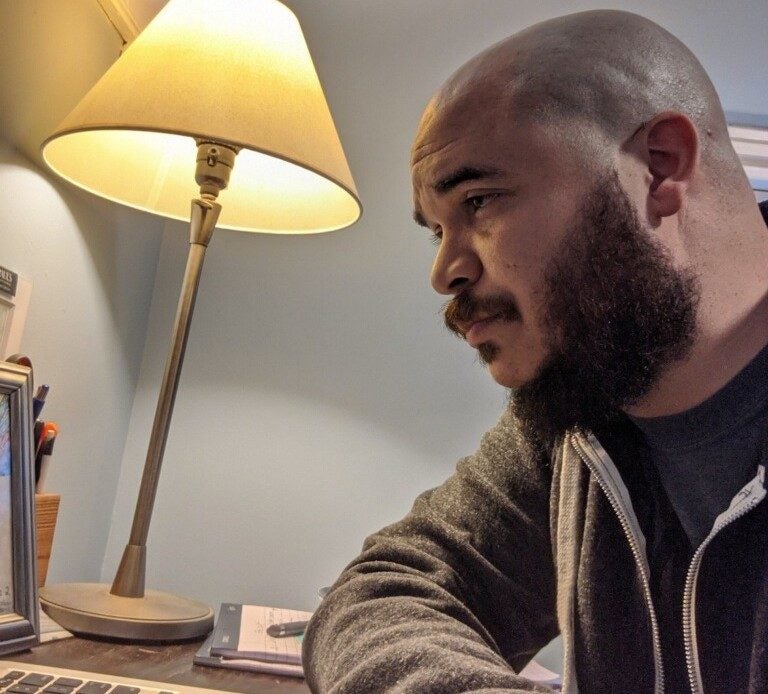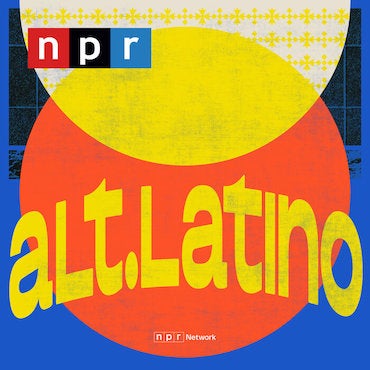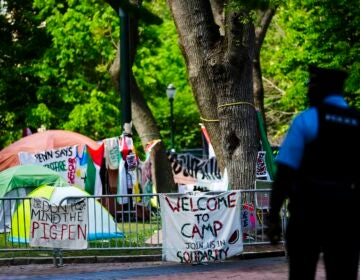UPenn chaplain discusses the decision to cancel classes, and the difficulties in returning to normal during coronavirus
Morning Edition host Jennifer Lynn speaks with Chaz Howard about being away from the groups of students with whom he usually engages on campus.
Listen 3:59
The Rev. Charles "Chaz" Howard, University Chaplain at the University of Pennsylvania (Chaz Howard)
During the COVID-19 outbreak, Morning Edition host Jennifer Lynn is checking in with individuals who live in our listening area to see how they’re coping.
This morning, we hear from Chaz Howard, chaplain at the University of Pennsylvania. He’s working from home in Montgomery County, away from the groups of students with whom he usually engages on campus.
Now he must inspire and listen to them in their times of joy and need – remotely.
Like some of us, he’s balancing work from home with care for his own children who are home from school.
He has two teenagers and a kindergarten-age daughter.
—
I do have a little kindergartener, she’s five years old. In a lot of ways, it’s hard having little people around here to demand a lot of attention. They need a lot of care … on the other hand, her kind of perpetual joy and … innocence of being oblivious to what’s going on, there’s a light in that.
And then the older daughters in their teens, you must be having some conversations.
Yes. My high schooler and my middle schooler are far more aware of what’s going on in the world. I think they still have a kind of youthful optimism. They’re still looking ahead to next year. Cross-country season and soccer season next fall. There’s a challenge for adults, too. The feeling like we need to be strong and yet we’re human, too.
Oh, absolutely. You’re strong for a lot of people, a lot of times, because of your role as university chaplain at UPenn. That must have been difficult when your student life around you was turning into something else. Students had to leave the campus. They have to learn remotely. And your main job is bringing people physically together.
Yeah, it was the right decision to send students home, yet it doesn’t make it an easy decision. So much of the joy of working in college life is engaging our students and seeing them come together on their teams, their clubs, for a cappella groups and dance troupes and things like that. Even coming together for lunch outside of our building. I don’t see that anymore. That’s hard.
Yeah. What is the new rhythm? What is the new way of connecting?
Well, you know, our students are back to school officially this week. They’ve been on an extended spring break. A lot of our faculty have been working hard to have some semblance of what was before online now. It’s not the same. I think one of things I’ve been trying to tell my colleagues is to not try to replicate what we were doing beforehand. It’s OK if it’s not as good as it was before. We’re learning as we go. We’re just doing our best.
I know you love to hold court. You love to have that space with students and people. You hold mass. So your spirituality, your connection, do you feel like it’s kind of bound up a little bit?
I think that in a lot of ways I, and a lot of people of faith, are pushing in deeper. I find myself diving a little more frequently and deeper in prayer and meditation than I would [normally]. Some of that is just more time on my hands. I’m not meeting all day with students and colleagues, so I have a little more time to read a little more and be quiet and breathe a little more. The flipside is, I think, really coming to grips with my and our humanity and the part that is just how fragile life is, just allowing ourselves to be sad and to be nervous and to be angry. I took one of those “social distancing walks” over the weekend and found this bench park where no one was. I just cried. To me, that’s an expression of spirituality, allowing ourselves to grieve and cry for everything that’s happening and will happen.
WHYY is your source for fact-based, in-depth journalism and information. As a nonprofit organization, we rely on financial support from readers like you. Please give today.



![CoronavirusPandemic_1024x512[1]](https://whyy.org/wp-content/uploads/2020/03/CoronavirusPandemic_1024x5121-300x150.jpg)


